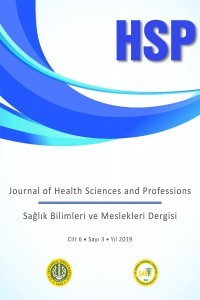İrritable Bağırsak Sendromlu Hastalarda Gastrointestinal Semptomların Umutsuzluk ve Depresyon Düzeyine Etkisi
Amaç: Bu çalışma irritable bağırsak sendromu olan hastalarda gastrointestinal semptomların depresyon ve umutsuzluk düzeyine etkisini belirlemek amacıyla planlanmıştır. Gereç ve Yöntem: Çalışmanın yapıldığı üniversite hastanesinin gastroenteroloji polikliniğine IBS tanısı almış günde ortalama 3 hasta başvurmaktadır. Araştırmanın evrenini 01.03.2017-05.08.2017 tarihleri arasında polikliniğe başvuran 314 hasta, örneklemini ise 18 yaş ve üzeri, IBS tanısı almış, iletişim sorunu olmayan ve araştırmaya katılmayı kabul eden 209 birey oluşturmuştur.Veriler hastaların sosyodemografik özelliklerini içeren Hasta Tanıtım Formu, Gastrointestinal Semptom Değerlendirme Ölçeği(GSDÖ, Beck Depresyon Ölçeği(BDÖ) ve Beck Umutsuzluk Ölçeği(BUÖ) ile toplanmıştır. Verilerin değerlendirilmesinde yüzdelik, t testi, kikare testi, ANOVA ve pearson korelasyon testi kullanılmıştır. Bulgular: Yaş ortalaması 40.69±14.0 olan hastaların, ortalama hastalık süresi 6.0±1.3 yıldır. Hastaların GSDÖ’nden aldıkları toplam puan ortalaması 52.0±1.65 olup, orta düzeyde semptom şiddetine sahip oldukları görülmüştür.. BUÖ puan ortalaması 8.0±3.1, BDS puan ortalaması 10.0±6.9 olup, hafif düzeyde umutsuzluk ve depresyon belirtisine sahip olduğu görülmüştür. GSDÖ alt boyutlarından karın ağrısı, reflü, hazımsızlık, diyare ve GSDÖ toplam puanıyla BUÖ ve BDÖ arasında anlamlı bir ilişki saptanmazken,konstipasyon alt boyut puanıyla BUÖ arasında pozitif yönde orta düzeyde bir ilişki saptanmıştır. Benzer şekilde BDÖ ile konstipasyon alt boyut puanıyla pozitif yönde güçlü düzeyde bir ilişki saptanmıştır. Sonuç: Konstipasyon ile depresyon ve umutsuzluk arasında güçlü ve orta düzeyde bir ilişki saptanmıştır. Özellikle konstipasyonu olan hastaların depresyon ve umutsuzluk düzeyi açısından değerlendirilmesi gerekmektedir.
The Effect of Gastrointestinal Symptoms on Hopelessness and Depression in Patients with Irritable Bowel Syndrome
Objective: The present study aimed to determine the effect of gastrointestinal symptoms on hopelessness and depression in patients with irritable bowel syndrome (IBS). Material and Methods: An average of 3 patients were admitted to the gastroenterology polyclinic of the university hospital where they worked. The universe of the study included 314 patients who presented at the clinic between March, 1st 2017 and August, 5th 2017, while the sample consisted of 209 patients who were aged 18 and older, were diagnosed with IBS, had no barriers to communication, and agreed to participate in the study. Data was collected using the Patient Identification Form containing the socio-demographic characteristics, the Gastrointestinal Symptom Rating Scale (GSRS), the Beck Depression Inventory (BDI), and the Beck Hopelessness Scale (BHS). Data was analyzed using percentiles, t-test, chi-square test, ANOVA, Pearson correlation, and regression analysis. Results: Mean age of the patients was 40.69±14.0, while mean disease duration was 6.0±1.3 years. Mean GSRS score was 52.0±1.65, indicating moderate symptom severity. Mean BHS score was 8.0±3.1 and mean BDI score was 10.0±6.9, indicating mild hopelessness and depression. The abdominal pain, reflux, indigestion, and diarrhea subscale scores of the GSRS and the total GSRS score were not significantly correlated with the BHS and BDI scores (p<0.05); while the constipation subscale score of the GSRS had a positive and moderate correlation with the BHS score (p<0.0001; r=0.24). The constipation subscale score of the GSRS also had a positive and strong correlation with the BDI score (p<0.0001; r=0.41). Conclusion: Constipation was strongly and moderately correlated with depression and hopelessness. Patients with constipation, in particular, should be screened for depression and hopelessness.
___
- 1. Longstreth GF, Thompson WG, Chey WD, Houghton LA, Mearin F, Spiller RC. Functional bowel disorders. Gastroenterology. 2006;130(5):1480-91.
- 2. Drossman DA, Camilleri M, Mayer EA, Whitehead WE. AGA technical review on irritable bowel syndrome. Gastroenterology.2002; 123(6):2108-31.
- 3. Dancey CP, Backhouse S. Towards a better understanding of patients with irritable bowel syndrome. J Adv Nurs.1993;18(9):1443-50.
- 4. Drossman DA, Li Z, Andruzzi E, Temple RD, Talley NJ, Thompson WG, Whitehead WE, Janssens J, Funch-Jensen P, Corazziari E, et al.U.S. householder survey of functional gastrointestinal disorders. Prevalence, sociodemography, and health impact. Dig Dis Sci. 1993; 38(9):1569-80.
- 5. Wells NE, Hahn BA, Whorwell PJ.Clinical economics review: irritable bowel syndrome. Aliment Pharmacol Ther. 1997; 1997;11(6):1019-30.
